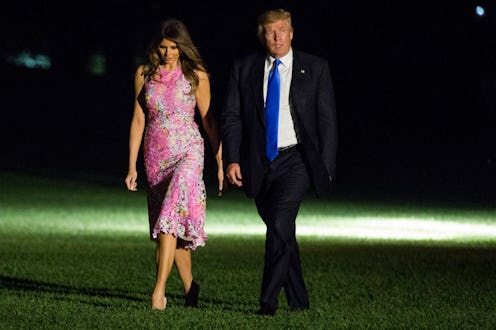News
Is Trump’s Transgender Military Ban Even Legal?

On Wednesday morning, President Donald Trump tweeted that transgender people would no longer be allowed to serve in the military, which raises the question of whether or not this move, which appears to ban a group of people from service based on their gender identity, is indeed constitutional.
After consultation with my Generals and military experts, please be advised that the United States Government will not accept or allow Transgender individuals to serve in any capacity in the U.S. Military. Our military must be focused on decisive and overwhelming victory and cannot be burdened with the tremendous medical costs and disruption that transgender in the military would entail. Thank you.
While Trump's decision to reinstate the service ban, which was only lifted last June, may seem like it's on shaky legal grounds, it's important to remember that gender identity and sexual orientation are "not explicitly include[d] ... [among the] protected bases" of the Civil Rights Act, which protects marginalized identities from discrimination.
It's also important to recall a similar precedent — Don't Ask, Don't Tell — that was indeed considered constitutional at the time. DADT, which prevented gay, lesbian and bisexual military members from serving openly, was ruled unconstitutional by a lower federal court. However, after that initial ruling, the Supreme Court actually upheld the constitutionality of the Pentagon's decision to effectively closet its LGB service members. However, the transgender service ban does differ from DADT some since the latter was a federal law and the former is a Pentagon guideline.
According to estimates, roughly 15,000 transgender people currently serve in the military, and it remains unclear in what manner these people will be discharged from the military.
According to the American Civil Liberties Union, transgender people should be protected from discrimination based on the First Amendment:
At the ACLU, we believe that the First Amendment, which bars the government from censoring speech or expression, should also protect individuals' right to wear clothes or groom themselves in ways that express their personal sense of gender. There aren't a lot of court decisions on this yet, but we hope eventually to see courts rule that gender expression is protected by the First Amendment. We also believe that the rights to "liberty," "privacy," and "autonomy" courts have found to be protected under the Due Process Clause of the U.S. Constitution should extend to transgender people's ability to make decisions about self-expression, medical care, and more, but there isn't much law on that issue yet either.
However, as the ACLU does note, there are few federal-level laws that explicitly protect the trans community from discrimination and the Supreme Court has never considered this issue.
So though Trump's decision may not defy federal legal statutes, it does mark another setback for transgender Americans under the Trump administration, which recently rolled back Obama-era guidelines protecting transgender students.